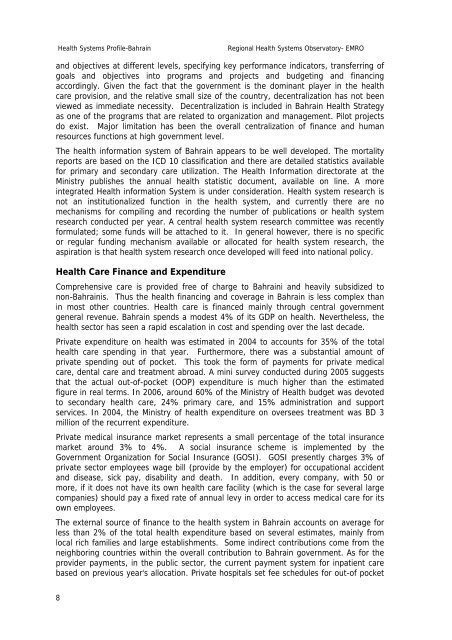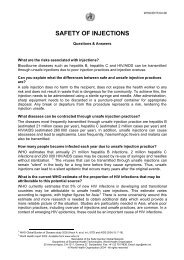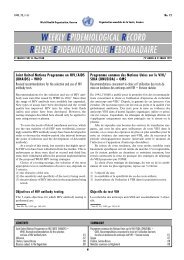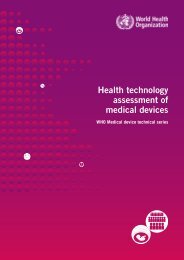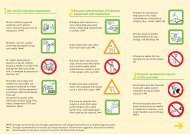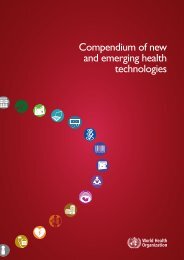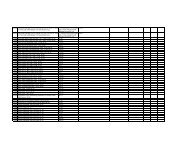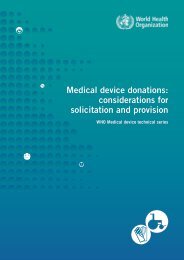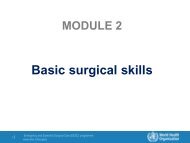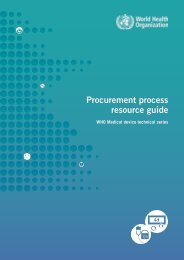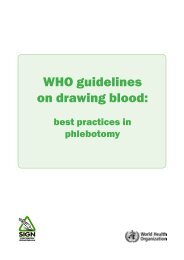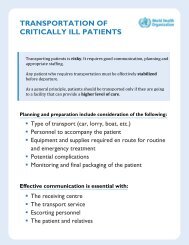Bahrain : Complete Profile - What is GIS - World Health Organization
Bahrain : Complete Profile - What is GIS - World Health Organization
Bahrain : Complete Profile - What is GIS - World Health Organization
Create successful ePaper yourself
Turn your PDF publications into a flip-book with our unique Google optimized e-Paper software.
<strong>Health</strong> Systems <strong>Profile</strong>-<strong>Bahrain</strong><br />
Regional <strong>Health</strong> Systems Observatory- EMRO<br />
and objectives at different levels, specifying key performance indicators, transferring of<br />
goals and objectives into programs and projects and budgeting and financing<br />
accordingly. Given the fact that the government <strong>is</strong> the dominant player in the health<br />
care prov<strong>is</strong>ion, and the relative small size of the country, decentralization has not been<br />
viewed as immediate necessity. Decentralization <strong>is</strong> included in <strong>Bahrain</strong> <strong>Health</strong> Strategy<br />
as one of the programs that are related to organization and management. Pilot projects<br />
do ex<strong>is</strong>t. Major limitation has been the overall centralization of finance and human<br />
resources functions at high government level.<br />
The health information system of <strong>Bahrain</strong> appears to be well developed. The mortality<br />
reports are based on the ICD 10 classification and there are detailed stat<strong>is</strong>tics available<br />
for primary and secondary care utilization. The <strong>Health</strong> Information directorate at the<br />
Min<strong>is</strong>try publ<strong>is</strong>hes the annual health stat<strong>is</strong>tic document, available on line. A more<br />
integrated <strong>Health</strong> information System <strong>is</strong> under consideration. <strong>Health</strong> system research <strong>is</strong><br />
not an institutionalized function in the health system, and currently there are no<br />
mechan<strong>is</strong>ms for compiling and recording the number of publications or health system<br />
research conducted per year. A central health system research committee was recently<br />
formulated; some funds will be attached to it. In general however, there <strong>is</strong> no specific<br />
or regular funding mechan<strong>is</strong>m available or allocated for health system research, the<br />
aspiration <strong>is</strong> that health system research once developed will feed into national policy.<br />
<strong>Health</strong> Care Finance and Expenditure<br />
Comprehensive care <strong>is</strong> provided free of charge to <strong>Bahrain</strong>i and heavily subsidized to<br />
non-<strong>Bahrain</strong><strong>is</strong>. Thus the health financing and coverage in <strong>Bahrain</strong> <strong>is</strong> less complex than<br />
in most other countries. <strong>Health</strong> care <strong>is</strong> financed mainly through central government<br />
general revenue. <strong>Bahrain</strong> spends a modest 4% of its GDP on health. Nevertheless, the<br />
health sector has seen a rapid escalation in cost and spending over the last decade.<br />
Private expenditure on health was estimated in 2004 to accounts for 35% of the total<br />
health care spending in that year. Furthermore, there was a substantial amount of<br />
private spending out of pocket. Th<strong>is</strong> took the form of payments for private medical<br />
care, dental care and treatment abroad. A mini survey conducted during 2005 suggests<br />
that the actual out-of-pocket (OOP) expenditure <strong>is</strong> much higher than the estimated<br />
figure in real terms. In 2006, around 60% of the Min<strong>is</strong>try of <strong>Health</strong> budget was devoted<br />
to secondary health care, 24% primary care, and 15% admin<strong>is</strong>tration and support<br />
services. In 2004, the Min<strong>is</strong>try of health expenditure on oversees treatment was BD 3<br />
million of the recurrent expenditure.<br />
Private medical insurance market represents a small percentage of the total insurance<br />
market around 3% to 4%. A social insurance scheme <strong>is</strong> implemented by the<br />
Government <strong>Organization</strong> for Social Insurance (GOSI). GOSI presently charges 3% of<br />
private sector employees wage bill (provide by the employer) for occupational accident<br />
and d<strong>is</strong>ease, sick pay, d<strong>is</strong>ability and death. In addition, every company, with 50 or<br />
more, if it does not have its own health care facility (which <strong>is</strong> the case for several large<br />
companies) should pay a fixed rate of annual levy in order to access medical care for its<br />
own employees.<br />
The external source of finance to the health system in <strong>Bahrain</strong> accounts on average for<br />
less than 2% of the total health expenditure based on several estimates, mainly from<br />
local rich families and large establ<strong>is</strong>hments. Some indirect contributions come from the<br />
neighboring countries within the overall contribution to <strong>Bahrain</strong> government. As for the<br />
provider payments, in the public sector, the current payment system for inpatient care<br />
based on previous year's allocation. Private hospitals set fee schedules for out-of pocket<br />
8


